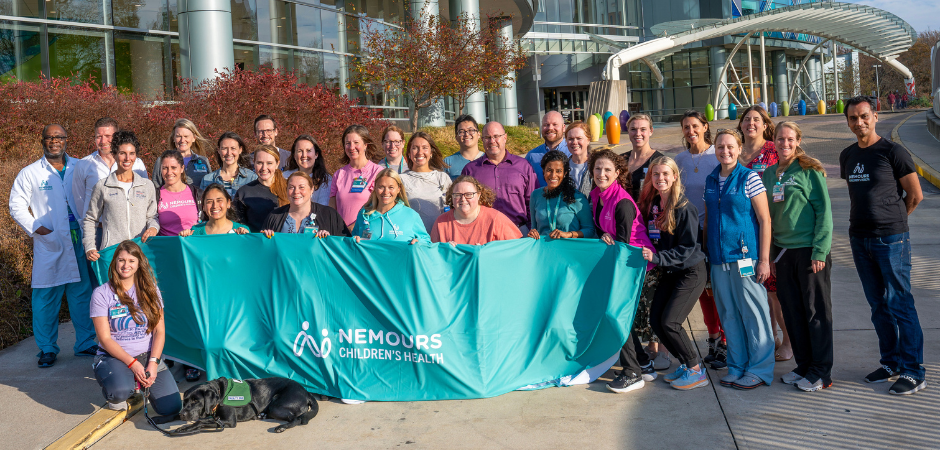The Society of Critical Care Medicine’s ICU Heroes Award is given to an ICU patient, their family, and the multiprofessional team that delivered the care. The 2025 ICU Heroes Award recipients are Perris Jones, Nate Griffith, their families, and their ICU teams.
The Society of Critical Care Medicine’s ICU Heroes Award recognizes that patients and families are an integral part of intensive care unit (ICU) care. The award is given to an ICU patient, their family, and the multiprofessional team that delivered the care. Two awards are given: one for an adult ICU and one for a pediatric ICU. The 2025 ICU Heroes Award recipients are Perris Jones, Nate Griffith, their families, and their ICU teams.
On November 9, 2023, the University of Louisville football team played the University of Virginia. Midway through the third quarter, Virginia running back Perris Jones caught a short pass around midfield and charged through a hole created by two of his teammates. An oncoming defender sprinted toward Perris to tackle him. The two players’ helmets collided. The football popped loose as Perris fell to the ground and lay motionless,
unable to move his extremities.
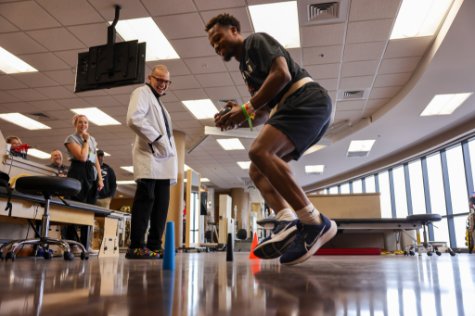 |
| Perris Jones training in the rehabilitation center. Photo courtesy of Perris Jones. |
Michelle Campbell, APRN, a neurosurgery nurse at the University of Louisville Hospital, watched the play on TV at home and immediately called her on-call resident. “I instantly knew that he would be my patient,” she said, “either with a spinal cord injury or a traumatic brain injury.”
She was right. Perris was admitted to the ICU at the University of Louisville Hospital, and the spinal cord injury protocol was initiated. He regained feeling and movement in his arms and legs but had a tingling feeling all over his body. Before the injury, Perris was eyeing a career in the National Football League. That hope was gone when Ms. Campbell met him the next morning. What struck her about Perris was his maturity amid his jarring reality.
“He was so calm and took every word in,” she said. “He was so polite. I fussed at him for calling me ‘ma’am’. His trainer and coach said that’s just him. They said he is a special person, and I could see that immediately.” Perris underwent spinal surgery the next day to remove a protruding disc. He spent eight days in the surgical ICU before being discharged to a rehabilitation center. He credited his care team with making his recovery possible. “Immediately there was a family aspect that was poured into me,” Perris said. “They genuinely wanted me to be okay, making sure that I was mentally okay and of course physically, but giving me as much comfort as possible.”
Ms. Campbell was one of those people. She spent hours with Perris, talking to him about everything, from his experience at Virginia to her appreciation for Baltimore Ravens quarterback Lamar Jackson. “Unlike the neurosurgeons I work with, I can’t fix someone’s spinal cord injury or brain injury surgically, but I can help my patients and families understand and cope with their life-changing injury,” Ms. Campbell said. “I needed to figure out what motivated him and how to help him cope with his injury because his life changed with that play that night. I could not imagine how hard that would be. Those talks made me a better person and a better practitioner.”
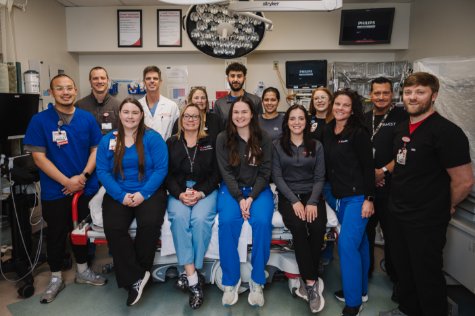 |
| The team who treated Perris Jones at the University of Louisville Hospital in Louisville, Kentucky. Photo courtesy of Perris Jones. |
They also made her a new person in Perris’ eyes. She was no longer “ma’am,” she was now “Mama Michelle.” Even now, the two continue to talk almost daily. Perris was discharged from rehabilitation almost three weeks after being injured.
Kristen M. Livers, PharmD, BCCCP, the clinical pharmacy supervisor at University of Louisville Hospital, credited the phenomenal communication across the multiprofessional team for allowing Perris to walk away from what could have been a life-altering injury. From “Mama Michelle” calling in to alert the hospital about Perris’ injury, to collaborations across departments, to constant communication among both college programs, it was clear people cared about helping Perris recover.
“It really felt like the whole city of Louisville rallied around him,” Dr. Livers said. Perris felt that care and is now on a mission to share that same feeling with as many people as possible. Perris returned to the University of Louisville Hospital to speak as a trauma survivor and serve as an inspiration to other patients. He is doing more motivational speaking and has visions of starting a nonprofit to help amplify his message.
“I want to spread hope because I feel like that’s something that the world is lacking,” Perris said. “I also feel like it’s a tool that’s so powerful. One of the major things that the care team instilled in me when I was at the hospital was hope and believing in a better outcome. I want to pass that forward and give that to as many people as possible.”
Dr. Livers was not surprised to hear Perris’ plan. “He’s always thinking about someone else and what he can do to help lift someone else up,” she said. “He is that special person that none of us will ever forget.”
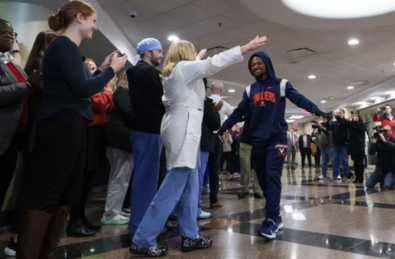 |
| Perris Jones going in for a hug with Michelle Campbell, APRN, after discharge from rehabilitation. Photo courtesy of Perris Jones. |
Nearly 700 miles east of Louisville, 21 days after Perris was discharged, nine-year-old Nate Griffith began his own unforgettable journey, the latest in his already extensive medical history. Nate was born with Down syndrome and congenital heart disease. He had open heart surgery and was diagnosed with transient myeloproliferative disorder and leukemia, all before he was two years old. On December 19, 2023, he arrived at the Nemours Children’s Hospital emergency department in Wilmington, Delaware with fever, cough, and fatigue.
 |
| Nate Griffith in the hospital with his parents Krista and Ted. Photo courtesy of Ted Griffith. |
“We were very accustomed to Nate being sick, so the fact that he was coughing and throwing up was concerning but didn’t seem out of the ordinary,” his father Ted Griffith said. “We had been overnight in the hospital with him many times before. We didn’t have an inkling how dire his condition was about to get.”
Nate was admitted to the hospital and diagnosed with pneumonia. Ten days later, he was admitted to the pediatric ICU (PICU) for persistent hypoxia. His condition worsened. He developed pediatric acute respiratory distress syndrome and was placed in a medically induced coma. His care team recommended initiating extracorporeal membrane oxygenation (ECMO).
Nate’s parents had never heard of ECMO. “In describing ECMO to us, the doctors were careful not to use the term ‘life support,’ which has such bleak connotations in the public’s mind,” Nate’s mother Krista Griffith said. “But once we put two and two together and figured out that our son had been placed on life support, we had to confront the very real possibility he was not going to survive.”
The day after ECMO was initiated, the tip of Nate’s cannula shifted and blood clots began to form. An interventional radiology team guided the cannula back into position, just one part of a massive multiprofessional team determined to help Nate recover. Nate spent five days on ECMO, still in a coma.
“We’d never before witnessed such skill and courage as exhibited by these ICU medical professionals,” Krista said. “They did their heroic work in the face of a crisis that was unimaginable to us.” Nate had several more complications, including upper airway obstruction and viral gastroenteritis before beginning to improve. In early February 2024, he was transferred to inpatient rehabilitation for physical, occupational, speech, music, and art therapies. He ultimately spent 73 days in the hospital, including 32 in the PICU.
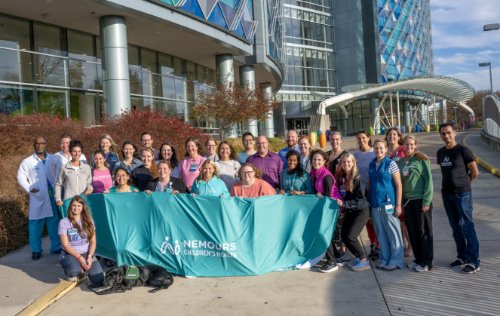 |
| The team who treated Nate Griffith at Nemours Children’s Hospital in Wilmington, Delaware. Photo courtesy of Nemours Children’s Health. |
What struck Nate’s many team members about him was his positive disposition, even with all the challenges he faced in his life. “If you saw him, you would never know that he went through all of that in the PICU, you would just never know,” said Shirley D. Viteri, MD, MSHQS, medical director of Nemours’s PICU. “He’s a very active, vibrant, smiling kid who just doesn’t seem to have a care in the world.”
Ted said his son continues to be active and healthy. He’s back to playing basketball and roughhousing with his older brother Sam and the family’s 90-pound black labrador retriever. He recently joined his school’s choir and continues his hobby as an amateur photographer. “He’s always grabbing our phones to take pictures of everything around him,” Ted said. “He takes great pictures of people because they smile at him with such warmth when they see him.” That warmth was on display at Nemours. “He went with the flow, no matter what challenges,” Dr. Viteri said. “That really inspired all of us.”
Nate’s mother said it was the care team who were the true inspiration, and she made sure to share that fact with as many people as possible. Krista Griffith is a Delaware state representative. In May, she invited members of the team to Legislative Hall to be recognized before the General Assembly as part of National Critical Care Awareness and Recognition Month. Krista shared her family’s experience and the importance of critical care professionals such as those who cared for her son.
“Heroics in an ICU are routine. They’re happening every day,” she said in her speech. “Because of that, it’s easy not to fully appreciate what these doctors and nurses do. But it’s vital that we recognize them today and every day.” The Griffith family is honored that Nate is receiving the ICU Heroes Award, and it is all the more meaningful because the award is shared with the men and women who saved Nate’s life. “It’s very fitting that the ICU Heroes Award recognizes the patient and family as well as the care team because we all worked together as a team,” Krista said. “There were moments when it felt like we were the underdogs in the contest against death, but we pulled out the win.”
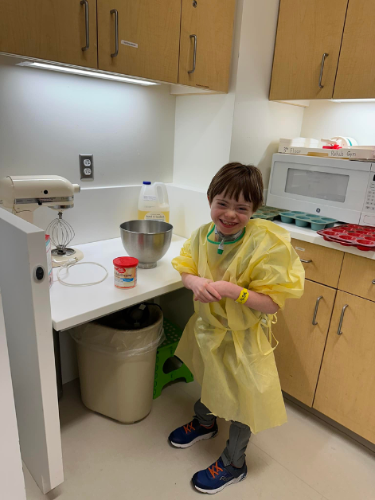 |
| Nate Griffith baking a cake in the hospital kitchen. Photo courtesy of Ted Griffith. |
